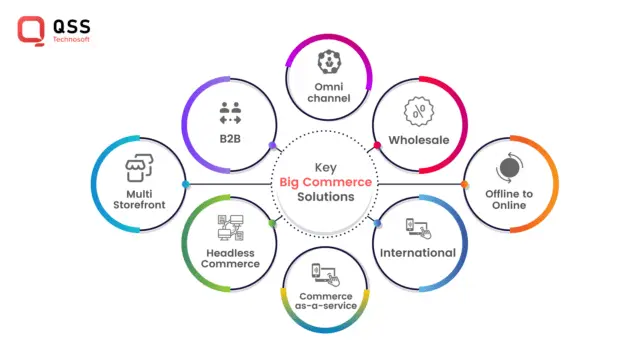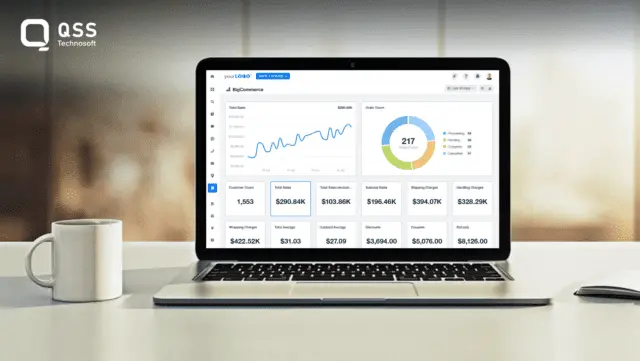Hey! Are you equipped to take your business international and make the most of the virtual global? If your answer is yes, then have you taken into consideration BigCommerce as your eCommerce platform?
Today, e-commerce has completely changed the way organizations engage with their clients. Now, companies are seeking out strong e-trade solutions to be able to satisfy their target audience as e-commerce will become extra state-of-the-art. Have you ever questioned what platform might be exceptional in your company to achieve this height commercial enterprise?
We would really like to introduce BigCommerce to you as a high-quality eCommerce platform that helps organizations with its many features and smooth application UI. Did you already know that BigCommerce powers over 90,000 eCommerce websites internationally, producing billions of dollars in sales every year?
These days, eCommerce has completely modified how agencies interact with their clientele. Businesses are seeking out strong eCommerce answers to draw in their target audience as e-trade becomes an increasing number of common. Have you ever pondered which platform would be best for your company to succeed in this cutthroat industry?
BigCommerce is a popular cloud-based platform that provides businesses with a complete suite of eCommerce tools and features. It offers a wide range of functionalities, including website design, product management, secure checkout, marketing tools, and analytics. The platform also integrates with numerous third-party services, allowing businesses to expand the capabilities of their online stores.
But here’s the question you might be pondering – what are the cost implications of building an eCommerce platform on BigCommerce? Understanding the financial investment is crucial before diving into any business venture.
Let’s explore the cost factors involved in setting up your online store on BigCommerce to help you make an informed decision.

Read Also: How Much Does It Cost to Build an Ecommerce Platforms on Shopify Plus?
Understanding eCommerce Platform on BigCommerce
Building an eCommerce platform on BigCommerce requires technical expertise, time, and investment. BigCommerce is a cloud-based platform that offers a variety of features such as inventory management, shipping management, payment gateways, and customer management. It provides an all-in-one solution for businesses to create, manage, and grow their online stores.
With BigCommerce, businesses can use its robust API and developer-friendly architecture to customize their online stores according to their specific requirements. The platform offers a wide range of tools and features, such as product catalog management, inventory control, and order processing. It also supports multiple payment gateways, enabling secure and seamless transactions.

For example, a tech gadget retailer can utilize BigCommerce to create a visually appealing and user-friendly online store, customized with advanced filtering options, product comparison tools, and real-time inventory updates. They can also integrate popular social media channels and use email marketing campaigns to target specific customer segments.
What are the Benefits of Building an eCommerce Platform on BigCommerce?
Building an eCommerce platform on BigCommerce offers numerous benefits that can help businesses thrive in the online marketplace. With its powerful features and robust infrastructure, BigCommerce is a popular choice for businesses of all sizes. Lets explore six key benefits of building an eCommerce platform on BigCommerce
Scalability:
One of the biggest advantages of BigCommerce is its scalability. Whether you are a small startup or a well-established enterprise, BigCommerce can handle high traffic volumes and large product catalogs without compromising performance. For instance, popular shoe brand “Allbirds” has experienced significant growth using BigCommerce, managing to scale their business from an early-stage startup to a multi-million dollar company.
Extensive integrations:
BigCommerce offers a vast library of third-party integrations, providing businesses with the flexibility to connect with various tools and services. For example, businesses can integrate with popular marketing automation software like MailChimp to automate email campaigns, or they can leverage solutions like ShipStation for streamlined order fulfillment.
Mobile-friendly design:
In today’s mobile-centric world, having a mobile-friendly eCommerce platform is essential. BigCommerce offers responsive themes that adapt to different screen sizes, ensuring that the shopping experience remains seamless across all devices. A technical example of this is the utilization of CSS media queries to modify the layout and design based on the screen resolution.
SEO-friendly architecture:
BigCommerce has built-in features that help improve search engine optimization (SEO) rankings. It generates search engine-friendly URLs, provides customizable meta tags and headings, and offers tools for optimizing page load speed. For instance, the platform automatically generates structured data markup, making it easier for search engines to understand and index product information.
Read Also: AR in eCommerce – 10 benefits, use cases, and real-world examples for businesses
Robust security:
Security is a top priority for any online business. BigCommerce provides advanced security measures, including regular security updates, encrypted data transmission, and secure hosting. On top of that, the platform is Level 1 PCI DSS compliant, ensuring that sensitive customer data is protected.
Advanced analytics and reporting:
BigCommerce offers comprehensive analytics and reporting tools to track key performance metrics, such as conversion rates, average order value, and customer lifetime value. This data allows businesses to make data-driven decisions and optimize their eCommerce strategies. For example, businesses can use BigCommerce’s analytics dashboard to analyze the effectiveness of marketing campaigns and make necessary adjustments.

Features of BigCommerce
BigCommerce is packed with features that make it an excellent choice for businesses looking to build their online store. Here are some of the key features of the platform:
Responsive Design
BigCommerce provides responsive design templates, which means that a store can look great on any device, regardless of its size. The platform offers over 100 pre-designed templates, along with customizations that allow developers to tweak the layouts at their convenience. Developers can make changes to the CSS and JS code to achieve the desired look and feel of the store.
Multi-Channel Selling
BigCommerce enables merchants to sell products across multiple channels such as Amazon, eBay, Facebook, and more. This feature allows businesses to reach a broader audience and increase their visibility without having to integrate with multiple platforms. The integration process is straightforward and involves creating an account and syncing the relevant data from the store.
Search Engine Optimization (SEO)
BigCommerce offers built-in SEO features that enable store owners to optimize their website’s content for search engines. The platform supports canonical tags, which prevent duplicate content across the website, and custom URLs, which are SEO-friendly and easy to remember. BigCommerce also ensures fast load times, which is a crucial SEO factor.
Payment Options
BigCommerce supports a wide range of payment gateways such as PayPal, Stripe, Apple Pay, and more. This feature enables businesses to offer their customers a variety of payment options and reduces cart abandonment rates. Additionally, the platform allows for easy integration with payment gateways, with minimal development work required.
Product Management
BigCommerce provides robust product management features, such as bulk product uploads and real-time inventory management. The platform supports multiple product variants, including size, color, and style, and allows businesses to display product images, videos, and reviews.
Analytics and Reporting
BigCommerce’s analytics and reporting features help businesses keep track of their store’s performance. The platform offers a built-in analytics dashboard that shows site traffic, sales data, and customer behavior. In addition, businesses can integrate with third-party analytics tools such as Google Analytics for more comprehensive data.
Read Also: Generative AI in eCommerce: Top Benefits, Use Cases, and Real World Applications
Cost Breakdown to Build eCommerce Platform on BigCommerce
The cost of building an eCommerce platform on BigCommerce can vary depending on various factors such as design, development, integration, and customization requirements. Here is a cost breakdown of the various components involved:
- BigCommerce Subscription: The primary cost associated with using BigCommerce is the monthly or annual subscription fee. This cost varies based on the plan you choose, ranging from $29.95 per month for the Standard plan to $299.95 per month for the Pro plan. Higher-tier plans offer additional features and support, making them suitable for scaling businesses.
- Domain Name and SSL Certificate: Purchasing a domain name, usually costing around $10 to $20 per year, is necessary to establish your brand online. Additionally, it is crucial to secure your website with an SSL certificate, which can range from $50 to $200 per year, depending on the level of security required.
- Design and Development: Customizing your BigCommerce store to align with your brand and cater to user experience is vital. This involves hiring a professional web designer and developer who will create a visually appealing and functional website. The cost for design and development can range from $5,000 to $15,000, depending on the complexity of your requirements.
- Apps and Integrations: BigCommerce offers an extensive range of apps and integrations to enhance the functionality of your eCommerce platform. These apps may include analytics, marketing automation, payment gateways, and inventory management systems. The cost of these apps varies, with some being free and others charging a monthly subscription fee.
- Data Migration: If you are migrating an existing eCommerce platform to BigCommerce, you may need assistance with data migration. This process involves transferring product listings, customer data, and other essential information. The cost for data migration can vary depending on the complexity and volume of data, but it typically ranges from $500 to $2,000.
- Ongoing Maintenance and Support: Once your eCommerce platform is live, ongoing maintenance and support are essential to keep it running smoothly and address any issues that may arise. This may include software updates, server maintenance, and technical support. Budgeting approximately 10-15% of the initial development cost per year for maintenance and support is recommended.
Note: It is important to note that these costs are estimates and can vary depending on the specific requirements and complexities of your eCommerce platform. On top of that, it is advisable to allocate a budget for marketing and advertising expenses to drive traffic to your website and generate sales. For accurate cost estimation contact QSS Technosoft team for proposal.
Read Also: How PWA’s are Helping Ecommerce Businesses in Offering Seamless Online Shopping Experiences?
Process behind Developing eCommerce Platforms on BigCommerce
Developing eCommerce platforms on BigCommerce involves a systematic process that integrates various technical elements to create a robust and scalable online retail solution. This process entails several important steps, starting from planning and design to implementation and deployment. Here is an outline of the key stages in the development process of eCommerce platforms on BigCommerce:
Planning and Analysis:
- Requirement gathering: Understanding the client’s business objectives, target audience, and specific eCommerce requirements.
- Market research: Analyzing competitors, consumer behavior, and industry trends to identify unique selling points and opportunities.
- Functional and technical specification: Defining the desired features, functionalities, integrations, and customization needs.
Design and User Experience:
- Wireframing and prototyping: Creating a visual structure and navigation flow to establish a user-friendly eCommerce interface.
- Visual design: Developing a visually appealing and brand-consistent design that enhances the user experience and promotes conversions.
- UI/UX optimization: Conducting usability tests and incorporating user feedback to refine the design and ensure seamless navigation.
Development and Customization:
- Platform selection: Choosing BigCommerce as the eCommerce platform due to its robust features, scalability, and ease of customization.
- Backend development: Setting up the server, database, and integrating essential eCommerce functionalities such as product management, inventory, and payment gateways.
- Frontend development: Translating the design into HTML/CSS templates, implementing responsive web design, and optimizing page load speed.
Integration and Testing:
- Third-party integrations: Integrating with external services like shipping providers, CRM systems, email marketing tools, and social media platforms to enhance the overall functionality.
- Testing and QA: Conducting rigorous testing to identify and fix any bugs, ensure security, and ensure seamless integration of all components.
Deployment and Maintenance:
- Go-live preparation: Configuring the server, domain, SSL certificates, and setting up analytics tracking.
- Data migration: Transferring existing data from the old eCommerce platform to BigCommerce.
- Post-launch support: Providing ongoing maintenance, monitoring, and support services to ensure the platform’s smooth operation and address any technical issues that may arise.
Conclusion
Building an eCommerce platform on BigCommerce may require some time and investment, but trust me, it’s totally worth it! Businesses that are serious about establishing and expanding their online presence will find BigCommerce to be the ultimate solution. With its flexible and customizable features, you can create a store that truly reflects your brand personality (because who wants a cookie-cutter online shop, right?). Plus, the secure and reliable hosting environment ensures that your customers’ information is safe and your website is always up and running.
Now, let’s talk about the cost breakdown. We know numbers can be terrifying, but don’t worry! QSS Technosoft can help you navigate through this process and provide you with a tailored solution that fits your business needs and budget. We have the expertise to make your BigCommerce journey smooth and hassle-free. Outsourcing from QSS can bring you massive benefits.
What really sets BigCommerce apart is its scalability. As your business grows, you can easily expand your online store without worrying about hitting any limitations. And with its multi-channel selling capabilities, you can reach customers on various platforms, maximizing your sales potential. This means fewer headaches and more time to focus on what really matters – growing your business.
So, if you’re ready to take your eCommerce game to the next level, Contact us at QSS Technosoft team. We will ensure that your BigCommerce journey is personalized, successful, and backed by their top-notch support. Don’t wait any longer – seize the opportunity to establish a powerful and profitable online store! Contact QSS Technosoft now.
We are proud to mention that our work has been recognized by leading B2B reviews and research platforms like GoodFirms, Clutch, MirrorView, and many more.


How Much Does It Cost to Build an eCommerce Platform on BigCommerce?